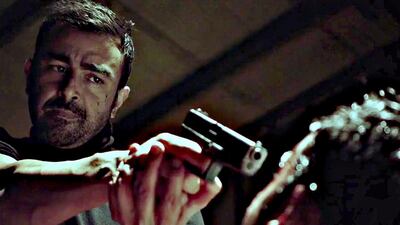The Pakistani action drama Waar has topped the Internet Movie Database (IMDB) poll as the highest-rated feature film of 2013.
Did a double-take there? So did I.
Waar has a score of 9.2 out of 10 from users of the comprehensive movie site. Waar beat heavily publicised Hollywood films such as The Wolf of Wall Street and 12 Years a Slave to the top spot. The highest-ranked Bollywood film on the list was Bhaag Milkha Bhaag – in fourth place. A surprising result, is it not, for a poll that featured seven American films in the top 10?
IMDB tries to ensure that its end-of-year list is a true reflection of global audience opinion and does this by installing a threshold: 10,000 users must vote for a film before it can qualify, thus preventing directors asking their friends and family to give high ratings to films that no one has seen.
But the fact that Waar topped the poll is a major surprise, especially as it has yet to be released in any of the major markets, such as China, the US and the UK, where it will be released on Friday.
Directed by Bilal Lashari, Waar hit cinemas in Pakistan in October to coincide with Eid Al Adha and premiered at the Dubai International Film Festival in December. Starring Shaan Shahid as Major Mujtaba, a former Pakistan army officer, the film is a stylised depiction of the “war on terror”, with references to real events, including the 2009 attack on a police academy in Lahore. Major Mujtaba is called back to active duty at the behest of the counter-terrorism team.
The success of Waar is perhaps even more surprising than when Gangs of Wasseypur came third on the equivalent list last year. The Anurag Kashyap thriller had been selected at the Cannes Film Festival and had extensive play around the globe, receiving critical acclaim.
So what is the explanation for Waar coming out on top of the IMDB list? The film is in English, which may have helped it get foreign voters, but given that it’s been released in so few territories it’s safe to assume that most of the votes have come from Pakistan. Yet no other film from Pakistan is near the top of the list so it’s not just about being from the right country.
Neither is it about the size of the population in India and Pakistan. If that was the case, there would be more Chinese films on the list. Also, the list is weighted so nearly everyone who votes has to vote positively and is averaged out. Some level of public acclaim is necessary for a film to be a success. But it does leave the question: is 10,000 a sufficient number?
What unregulated online movie polls seem to be demonstrating is that Bollywood and, now it seems, Lollywood are better than their Hollywood counterparts at making use of the internet to promote their products. This first became apparent in 1999 when a BBC poll to discover the most popular actor of stage and screen saw Amitabh Bachchan coming out on top, ahead of Sir Laurence Oliver, Charlie Chaplin and Marilyn Monroe.
Unlike in Hollywood, where stars such as George Clooney still question the value of fan interaction sites such as Twitter, every major Bollywood star has a Twitter account they tweet from regularly. Bachchan has seven million followers; Shah Rukh Khan commands six million. A recent social media analytics report by Thoughtbuzz highlighted how most Bollywood stars are using the microblogging site to promote their work – 27 per cent of the tweets going out are about forthcoming films.
But when IMDB acts like pollsters and starts weighting votes and raising the threshold to 25,000 voters as it does for its all-time top 250, which is based on votes from regular users, then Bollywood might find itself locked out (the highest-ranking Indian film on this list is Aamir Khan’s 3 Idiots at No 142).
But the makers of Waar, like their Bollywood counterparts, seem to have expertly tapped their online fans, benefiting from playing to a large, loyal niche audience, who when engaged are willing to go online in support. And it’s this savvy combination that always seems to win out in the IMDB end-of year votes.


